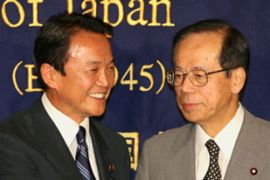Japan’s ruling party elects Fukuda
Liberal Democratic party picks Yasuo Fukuda in the hope he will bring stability as PM.

Published On 23 Sep 2007
‘Difficult situation’
Fukuda will be chosen as prime minister on Tuesday by virtue of the ruling party’s majority in parliament’s lower house.
He will face an energised opposition that won control of parliament’s upper chamber in elections in July.
Speaking after the vote, Fukuda said: “The LDP is facing an extremely difficult situation and I want to work first to revive the party and win back people’s trust.”
Tony Cheng, Al Jazeera’s correspondent in Tokyo, said: “It was a comforting margin of support. The Japanese were looking for a steady pair of hands.
“Fukuda comes from a family of political pedigree … they are looking to him to steady the ship … and stay there.”
The new leader also faces pressure to spend more money to woo disaffected voters while reining in Japan’s huge public debt.
The new leader also faces pressure to spend more money to woo disaffected voters while reining in Japan’s huge public debt.
The split in parliament has raised fears of a policy deadlock at a time when Japan needs action on pensions and tax reform as a wave of retirees add to welfare spending.
Critics of Fukuda, chief cabinet secretary under Abe’s popular predecessor Junichiro Koizumi, say he will be beholden to the LDP’s old guard, backpedal on vital economic reforms, and will lack boldness on the diplomatic front.
Milder style
Milder style
One man, attending a rally for Aso near LDP headquarters ahead of the vote on Sunday, said: “I think Aso is a politician who would lead the country in a sound direction. Fukuda isn’t. Aso would pursue the assertive diplomacy he implemented as foreign minister.”
However, supporters say Fukuda’s milder style will be welcome after Koizumi’s five years of combative reforms and 12 months of scandals and upsets under Abe.
Hiro Katsumata, who specialises in Japanese politics at Singapore’s Nanyang Technological University, told Al Jazeera: “Fukuda is very different from Abe, Aso and Koizumi and that was why he was chosen.”
He has pledged, as did Aso, to pay more heed to rural regions and other sectors hurt by reforms begun under Koizumi.
But he has also acknowledged the limits on government spending given a public debt already equivalent to one-and-a-half times Japan’s gross domestic product.
Abe, who turned 53 on Friday, stunned allies and foes alike by announcing his decision to resign just days after staking his career on extending a Japanese naval mission in support of US-led military operations in Afghanistan.
Avoiding pitfalls that would prompt a snap election for the lower house that the ruling party could lose will be a priority for Japan’s new leader.
No general election needs to be held until 2009.
But deadlock in parliament could prompt a new vote and many are eyeing next spring, after the passage of the budget for the fiscal year starting next April, as a likely time.
Source: Al Jazeera, News Agencies
